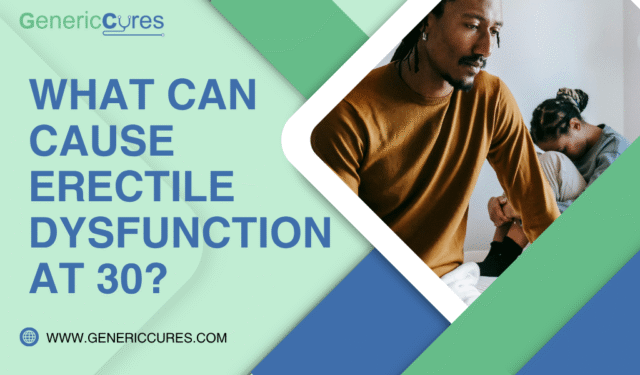Erectile dysfunction (ED) is often assumed to be an issue affecting older men, but many individuals in their 30s experience it, too. The condition can be distressing, confusing, and emotionally taxing—especially for younger men who don’t expect to face such issues so early in life. Understanding the causes of ED at 30 is the first step toward effective treatment and recovery.
This article explores the medical, psychological, and lifestyle factors behind ED at a younger age and offers guidance on how to regain sexual confidence and function.
Is It Normal to Have ED at 30?
While not common, ED at 30 is not unheard of. Studies show that approximately 26% of men under 40 experience some degree of erectile dysfunction. This means younger men are not immune to the condition and often experience unique causes related to lifestyle, stress, or hidden health issues.
The good news? ED at 30 is often treatable and reversible, especially when addressed early.
1. Psychological Causes of ED in Younger Men
One of the most common causes of erectile dysfunction in younger men is psychological stress. Mental and emotional issues can disrupt the mind-body connection essential for sexual arousal.
Key psychological triggers:
- Performance anxiety or fear of sexual inadequacy
- Stress from work or finances
- Depression or low self-esteem
- Relationship issues or trust concerns
- Trauma or past negative sexual experiences
When the brain is overwhelmed with stress, it reduces the release of chemicals responsible for arousal. This leads to difficulty in achieving or maintaining an erection, even if the physical health is otherwise good.
2. Lifestyle Habits That Impact Sexual Health
ED at 30 can often be traced to everyday habits that reduce blood flow, alter hormone levels, or damage nerve health.
Common contributing habits include:
- Smoking, which narrows blood vessels
- Excessive alcohol intake
- Poor diet high in saturated fats and sugar
- Lack of physical activity
- Frequent use of recreational drugs
These factors weaken blood circulation, disrupt testosterone levels, and impair the vascular and nervous systems—key players in maintaining an erection.
3. Medical Conditions Behind ED at 30
Sometimes, erectile dysfunction is an early warning sign of an underlying health condition.
Common medical culprits:
- Diabetes (Type 1 or 2)
High blood sugar damages nerves and blood vessels. - Hypertension
Elevated blood pressure reduces penile blood flow. - Obesity
Excess fat affects hormone levels and causes poor circulation. - High cholesterol
Leads to artery blockages. - Low testosterone (hypogonadism)
Affects sexual drive and stamina. - Peyronie’s disease
A condition that causes curvature and painful erections.
If you’re experiencing ED regularly, it’s crucial to rule out these conditions with a medical professional.
4. Pornography and Masturbation Habits
For some younger men, excessive pornography use may distort sexual expectations and impair the brain’s response to real-life sexual encounters. This can lead to a condition called porn-induced erectile dysfunction (PIED).
Coupled with frequent or aggressive masturbation, the body may develop a delayed or dulled response to actual intimacy.
Warning signs:
- Strong erections during porn but weak or no erections with a partner
- Loss of interest in real sex
- Needing specific porn scenarios to get aroused
Resetting your brain through abstaining from porn and reducing masturbation may help.
5. Medications That Can Affect Erections
Some drugs—even when prescribed—can contribute to erectile dysfunction. These include:
- Antidepressants (SSRIs)
- Anti-anxiety medications
- Blood pressure medications
- Steroids or muscle enhancers
If your ED began after starting a new prescription, consult your doctor for alternatives.
6. Sleep and Hormone Imbalances
Sleep is vital for testosterone production and vascular repair. Poor sleep habits or sleep apnea can lead to reduced libido and weaker erections.
Inadequate sleep can also reduce nitric oxide levels, which affects blood flow to the penis.
7. Sedentary Lifestyle and Lack of Exercise
Physical inactivity is directly linked to ED. Regular exercise increases blood circulation, boosts testosterone, and improves body image—all essential for sexual function.
Even 30 minutes of brisk walking or strength training a day can help reduce ED symptoms and improve confidence.
8. Relationship Problems and Communication Gaps
Intimacy isn’t just physical. A strained relationship can cause emotional distance, affecting sexual performance. Communication, trust, and mutual understanding are key to restoring intimacy and confidence.
Available Treatments and Remedies
The treatment of ED depends on its cause. Here are some potential options:
- Therapy for anxiety, stress, or relationship issues
- Lifestyle changes: quitting smoking, reducing alcohol, and exercising
- Medical checkups to rule out diabetes, hypertension, or low testosterone
- Oral medications like PDE5 inhibitors
One widely used option is Cenforce 120 mg, a high-strength oral ED medication that improves blood flow and erection quality.
Another trusted choice is to Buy Fildena 100mg, a reliable solution for men who prefer milder strength with effective outcomes.
For combination treatments targeting both erectile dysfunction and premature ejaculation, Super Vidalista offers dual-action results for those who need comprehensive help.
Can ED at 30 Be Reversed?
Yes, in most cases, ED at 30 can be reversed—especially when lifestyle habits are corrected, and stressors are addressed. Consistency is key. Treating the root cause, whether physical or psychological, is more sustainable than just managing symptoms.
When to See a Doctor
If ED is persistent (lasting more than 3 months), seek medical help. Early diagnosis can prevent long-term issues and improve your overall quality of life.
Final Thoughts
Erectile dysfunction at 30 can feel surprising and overwhelming, but it’s more common than most think. From lifestyle and psychological triggers to medical conditions, several factors may contribute. Don’t ignore the signs—address them early with trusted support from platforms like Genericcures, and you’ll be on the path to renewed confidence and performance.







